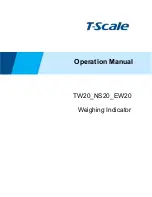
MI 3321 MultiservicerXA
Machine testing operating mode
122
Examples of insulation resistance measurement results
Displayed results:
Main result ............. insulation resistance
Notes:
The machine under test should be de-energized before the measurement!
Consider any warning on the display before starting the measurement!
Care must be taken if machine includes sensitive electrical equipment that could be
damaged if to high test voltage would be applied to them.
In this case the sensitive part should be disconnected from the tested circuitry.
Depending on the product standard, they should be tested with an appropriately
lower test voltage.
If surge protection devices are installed the test can be carried out only in a limited
manner.
Do not disconnect the machine under test from the instrument during the
measurement or before it is automatically discharged! The message
»Discharging…« is displayed while the voltage on DUT is higher than 20 V!
Do not forget to remove the L-N link after the tests.
9.2.4
High Voltage withstanding test
The High Voltage withstanding test is used to confirm integrity of the insulation
materials. During the test the insulation materials in the machine are stressed with a
higher voltage than during normal operation. A powerful AC high voltage source is
applied between the live/ neutral input terminals and the metal housing of the machine.
The instrument trips out if the leakage current exceeds the predefined limit.
IMPORTANT SAFETY NOTES
As a dangerous voltage of over 1000 V AC is applied at the HV instrument
outputs special safety consideration must be taken when performing this
test!
Requirements from EN 50191 for test installations and safety of withstanding
voltage testing shall be applied. Prohibition zone is 20 mm and no part of the
body can be closer to tested item. Two hands must strictly be in operation
during testing, one for manipulation with one of HV test tip and another with
manipulation with the START button on the MI 3321.
Disconnect and keep in safe place all unused test leads before starting this
measurement; otherwise the instrument can be damaged!
Only a skilled person familiar with hazardous voltages can perform this
measurement!
















































